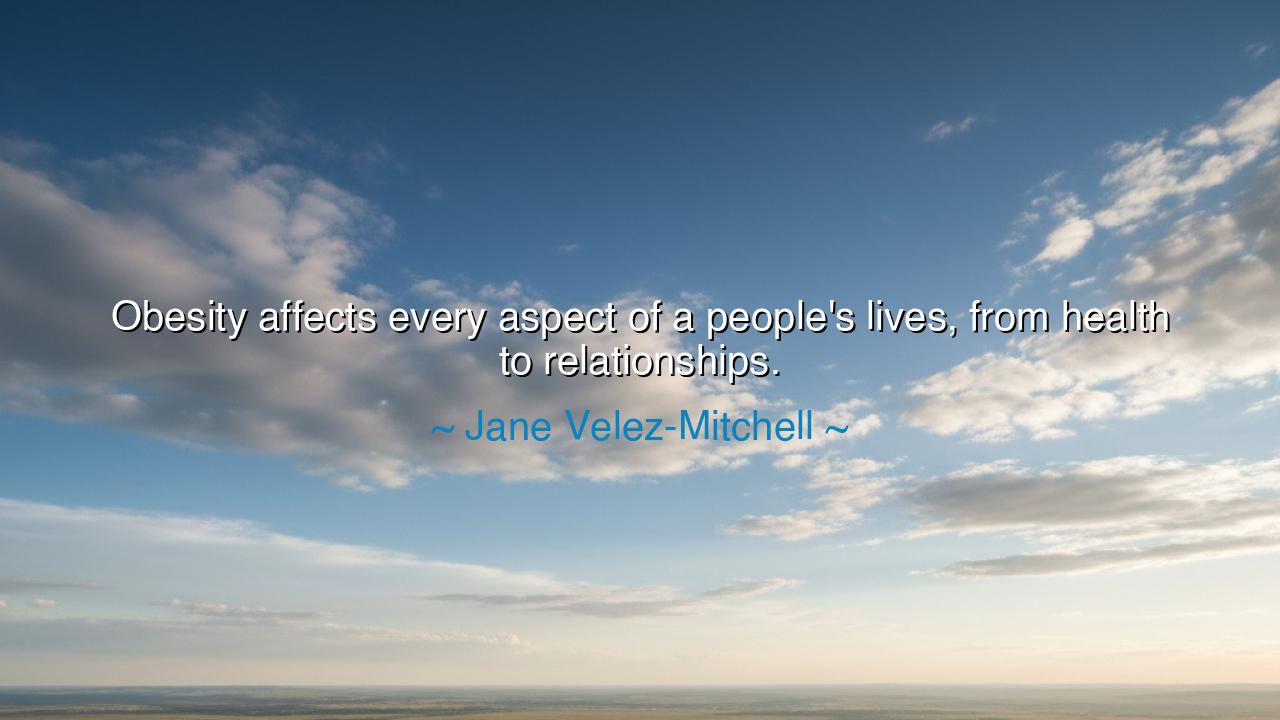
Obesity affects every aspect of a people's lives, from health to






In the words of Jane Velez-Mitchell, the keen observer of the human condition, we hear a truth both modern and eternal: “Obesity affects every aspect of a people’s lives, from health to relationships.” Though uttered in an age of convenience and abundance, her words carry the tone of ancient warning—the reminder that excess, in any form, can be both comfort and curse. For the ancients long knew what we have forgotten: that the body is the vessel of the soul, and to burden it beyond its strength is to dim the fire within.
The meaning of this quote is not confined to the flesh alone. When obesity is spoken of, it is not only the weight of the body that is meant, but the heaviness of imbalance—the overindulgence of desire, the neglect of harmony between body, mind, and spirit. Health, as the wise have always known, is not merely the absence of sickness but the state of alignment between one’s nature and one’s choices. When we drift from this harmony, the consequence is not only physical suffering, but the quiet erosion of relationships, confidence, and purpose.
In ancient Greece, the philosopher Hippocrates, father of medicine, taught that “Let food be thy medicine, and medicine be thy food.” He warned that gluttony dulls the mind and burdens the heart. In his time, those who lived beyond measure were said to be slaves not to fortune, but to appetite. Even then, it was known that excess weakens both body and spirit, and that moderation is not denial, but mastery. The same truth whispers in Velez-Mitchell’s words: that when a people lose discipline, they lose their vitality, their joy, and even the strength of their bonds with one another.
Consider the story of King Henry VIII of England—a man of immense power, yet undone by indulgence. His feasts were grand, his appetites greater still. In his later years, his obesity brought him pain, disease, and isolation. Once a vigorous ruler and warrior, he grew immobile and wrathful, his spirit darkened by the very pleasures he once adored. Those around him, fearful and weary, withdrew their affection. Thus, his body became a mirror of his kingdom—bloated, troubled, and in decline. From his tale we learn that unchecked desire consumes more than the flesh; it consumes the soul.
Velez-Mitchell speaks also of the relationships that suffer when imbalance reigns. When health falters, so too does connection—to oneself and to others. A person burdened by poor health may struggle with confidence, intimacy, or joy; a community burdened by widespread unwellness may lose its energy, productivity, and collective hope. What affects the individual heart, therefore, ripples outward to the nation’s heart. In this way, personal health becomes public destiny, and caring for the body becomes an act of love for all.
Her words are not condemnation, but compassion. For obesity, like many human trials, is not born of weakness but of a world that confuses pleasure with peace. We live amid abundance but hunger for meaning; we consume endlessly but rarely nourish. Velez-Mitchell reminds us that to heal, we must return to the wisdom of simplicity—movement, balance, awareness, and gratitude. To eat not merely to fill the stomach, but to honor the body that carries the soul.
The lesson is clear and timeless: treat your body as you would a sacred temple. Feed it with respect, move it with joy, and let it rest in peace. Beware the seduction of excess in all forms—be it food, comfort, or distraction. Seek harmony, not indulgence. For when the body is well, the heart is lighter, the mind clearer, and love flows freely once more.
Let the generations to come remember this teaching: health is the foundation of freedom, and to guard it is the truest act of wisdom. The one who rules their appetites rules their destiny. For as Jane Velez-Mitchell reminds us, the health of a people is not just their survival—it is their spirit made visible.






AAdministratorAdministrator
Welcome, honored guests. Please leave a comment, we will respond soon